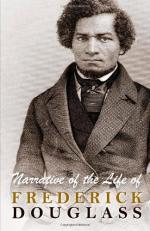|
|
The Narrative of the Life of Frederick Douglass Chapter 9
Douglass goes to live with Thomas Auld at St. Michael's in March 1832. His master is still the cruel man he had known over seven years ago at Colonel Lloyd's plantation. Having experienced many years of plentiful food in Baltimore, Douglass finds it particularly discomforting to feel constant hunger again. The slaves of his house have to resort to begging or stealing to survive. Thomas Auld is a cruel slaveholder even by the standards of the country. Being married into his role as a slaveholder, Thomas Auld is completely lacking in the ability to hold slaves. He is mean, yet cowardly-sometimes firm, and mostly insecure. Because of his inconsistency, the slaves do not respect him. Instead of calling him "master" they address him as Captain Auld.
In August 1832, Captain Auld experiences religion in a Methodist camp meeting. This brings the slaves neither emancipation nor a kinder master. Captain Auld actually becomes worse. Before, his actions are of his own depravity; now, they are justified by his religion. While he becomes a leader of revivals and his house a place of refuge for many preachers, his slaves continue to suffer under his care. Among the preachers that stay at Captain Auld's house, the slaves are most fond of Mr. George Cookman, who is instrumental in getting a rich slaveholder to emancipate his slaves. Whenever Mr. Cookman is around, the slaves pray that the same might happen to them.
In St. Michael's, a young white man, Mr. Wilson, sets up a Sabbath school to instruct slaves on the New Testament. But after only three meetings, religious folks wielding sticks and weapons close down the class. An example of Captain Auld's religious hypocrisy is in his dealings with a lame young slave, Henny. Badly burned in childhood, she does not have use of her hands and therefore considered a financial burden. He tries to give her away and when that fails, he sets her out on her own, basically to die. He whips her whenever he wishes. Master Auld, in his religious piety, claims to hold slaves to take care of them.
Douglass and Captain Auld do not get along. Captain Auld considers Douglass to have been spoiled by life in the city. Sometimes Douglass would let the master's horse run away to the farm of Master William Hamilton, Captain Auld's father-in-law, just so that he can get something to eat. Despite several beatings, Douglass is not broken. For that expressed purpose, Captain Auld lends Douglass to Edward Covey, a farm renter with a reputation for being a "nigger breaker." Although he hears horror stories about Mr. Covey, Douglass is happy to move because at least he would get enough to eat.




